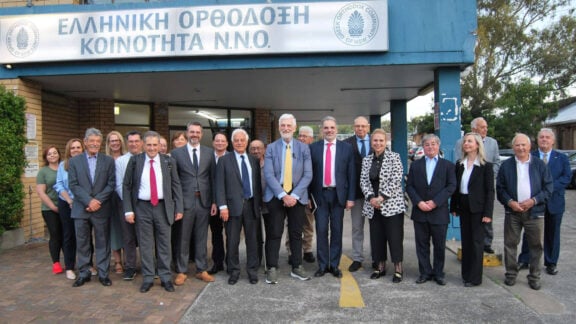Now that Prime Minister Kyriakos Mitsotakis has won his runoff election with a substantial mandate, it is perhaps worth asking about some of the prime minister’s priorities. Mitsotakis is an erudite American educated, multilingual fifty-something leader with substantial experience in navigating the many shoals, internal and external, which the Greek ship must navigate. Full disclosure: when I was in Greece for the first election in May, I voted for him, and in fact this is the first time I have ever voted for a right-of-center party in a national election for either of my countries, the United States and Greece.
I will limit my thoughts to issues of the Diaspora in this essay, as I hope this expanded, strengthened mandate will give the prime minister an opportunity to make substantial, meaningful, and needed changes.
We might start with the deputy minister for the diaspora being someone with expatriate/diaspora experience. With all the thousands of Greek nationals with either long residence in the Diaspora, or born there, why do we have a deputy minister designate with no clear diaspora connections? Mitsotakis’ previous choice of publisher Antonis Diamantaris may have run into issues, but he did have real and authentic diaspora ties, as the publisher of one of the largest newspapers in the diaspora, with several decades of living abroad.
Noteworthy first steps towards a diaspora vote
The current Greek vote and runoff was noteworthy in that the first fitful steps towards a diaspora voting mechanism have begun. Certainly, the actual numbers relative to the citizen pool were fitfully small, but it is a start. It would help if more ties to Greece aside from citizenship would be enough to permit voting, such as, say, a discharge from the military. There are thousands of Greeks abroad who left the country after doing military service, and certainly military service, even if decades old, ought to count as sufficient ties to Greece to warrant franchise abroad.
Hopefully the new bill now before parliament will allow any Greek citizen abroad on the electoral rolls to participate in national voting. Certainly, the Mitsotakis government has been as good as its word about prioritizing this. I also hope that any idea to carve out several deputies for the diaspora will not resurface, as this is likely to result in undue politicking for such positions. Better to add the votes of diasporans as individuals with varied opinions and politics to the national poll, rather than restricting their voice to a few deputies reserved for the diaspora.
Voters and voting abroad can suddenly change the calculus of Greek government engagement with the diaspora. Instead of engaging with organisations – including the Greek Orthodox Church – which may, or quite often may not be, truly represent the Greeks abroad in that area, the Greek government can start engaging with her citizens on a more cellular level, as individual voters. In such a way Greeks will be able to speak for themselves rather than via organisations which all too often are self-appointed and again all too often consist of non-citizens, often of the third, or fourth generation, who do not speak Greek (well) or have a limited knowledge of Greece and current issues in Greece. Greek governments and consular officials all too often ignore the voice of individual Greeks abroad, but if the diaspora citizens can vote, they will do so at their peril.
As a practical matter the actual voting pool relative to the diaspora of Greek descent is not large. There are far more people of Greek descent with few ties to Greece, or holding her citizenship than there are citizens living abroad. This is both natural and a good thing, and I would certainly not encourage everyone of Greek descent to try to apply for citizenship without actual ties to the country. That said, there are plenty of people in most diaspora locations with active ties to Greece and Greek citizenship, and they should be empowered.
A change of interface with Greek diaspora
Further, all too often currently the Greek government interfaces with diaspora figures that do not necessarily have the Greek ties they claim, nor do they necessarily speak for the Greek community in the diaspora location in question. When such individuals claim to speak for the Greek diaspora in said country and are actively or tacitly empowered to do so by the Greek government, all too often it results in organisations becoming gatekeepers as opposed to facilitators of a seamless, cellular interaction between Greek abroad and Greek in Greece. Voter empowerment abroad is an excellent way to avoid this.
Gatekeepers all too often will simply do the bidding of the Greek government in power to enhance their roles as community leaders. All too often this has been instrumentalized by Greek governments who want a pliant diaspora giving support without input. This is unfair and results, in less diaspora assistance and interaction than might occur with an engaged and empowered diaspora, one that also voices its support—and, crucially, its opposition—in word and in vote.
Finally, while the Greek government should continue to assist and to respect the roles of Greek advocacy and community organisations in promoting the various Greek causes in key diaspora capitals such as Washington, Canberra, Berlin, and Ottawa, the Greek government might also take a sheet from both the Turkish and Israeli playbooks and hire lobbyists based on efficacy and discretion rather than making Greek community ties a primary criterion.
All things considered Prime Minister Mitsotakis ought to be congratulated for his affirmative steps in correcting a situation that is both undemocratic and out of sync with most of Greece’s neighbours, where diasporas can vote abroad. This is particularly difficult to swallow when one considers the history of active diaspora involvement—financial, political, and yes, military—whenever Greece required it. We heard our country’s call, whether it was my grandfather eking out a living in Salt Lake City at the onset of the Balkan Wars, or the financiers of Alexandria to build a flagship for the Greek navy. We heard Greece’s voice, now hear ours.
Alexander Billinis is a Greek-American historian with a special interest in Greek maritime history, a university lecturer, and lawyer.









